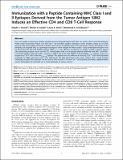| dc.contributor.author | Kissick, Haydn T. | en_US |
| dc.contributor.author | Sanda, Martin G. | en_US |
| dc.contributor.author | Dunn, Laura K. | en_US |
| dc.contributor.author | Arredouani, Mohamed S. | en_US |
| dc.date.accessioned | 2014-05-06T16:18:31Z | |
| dc.date.issued | 2014 | en_US |
| dc.identifier.citation | Kissick, Haydn T., Martin G. Sanda, Laura K. Dunn, and Mohamed S. Arredouani. 2014. “Immunization with a Peptide Containing MHC Class I and II Epitopes Derived from the Tumor Antigen SIM2 Induces an Effective CD4 and CD8 T-Cell Response.” PLoS ONE 9 (4): e93231. doi:10.1371/journal.pone.0093231. http://dx.doi.org/10.1371/journal.pone.0093231. | en |
| dc.identifier.issn | 1932-6203 | en |
| dc.identifier.uri | http://nrs.harvard.edu/urn-3:HUL.InstRepos:12153025 | |
| dc.description.abstract | Here, we sought to determine whether peptide vaccines designed harbor both class I as well as class II restricted antigenic motifs could concurrently induce CD4 and CD8 T cell activation against autologous tumor antigens. Based on our prior genome-wide interrogation of human prostate cancer tissues to identify genes over-expressed in cancer and absent in the periphery, we targeted SIM2 as a prototype autologous tumor antigen for these studies. Using humanized transgenic mice we found that the 9aa HLA-A*0201 epitope, SIM2237–245, was effective at inducing an antigen specific response against SIM2-expressing prostate cancer cell line, PC3. Immunization with a multi-epitope peptide harboring both MHC-I and MHC-II restricted epitopes induced an IFN-γ response in CD8 T cells to the HLA-A*0201-restricted SIM2237–245 epitope, and an IL-2 response by CD4 T cells to the SIM2240–254 epitope. This peptide was also effective at inducing CD8+ T-cells that responded specifically to SIM2-expressing tumor cells. Collectively, the data presented in this study suggest that a single peptide containing multiple SIM2 epitopes can be used to induce both a CD4 and CD8 T cell response, providing a peptide-based vaccine formulation for potential use in immunotherapy of various cancers. | en |
| dc.language.iso | en_US | en |
| dc.publisher | Public Library of Science | en |
| dc.relation.isversionof | doi:10.1371/journal.pone.0093231 | en |
| dc.relation.hasversion | http://www.ncbi.nlm.nih.gov/pmc/articles/PMC3972205/pdf/ | en |
| dash.license | LAA | en_US |
| dc.subject | Biology and Life Sciences | en |
| dc.subject | Cell Biology | en |
| dc.subject | Cellular Types | en |
| dc.subject | Animal Cells | en |
| dc.subject | Blood Cells | en |
| dc.subject | White Blood Cells | en |
| dc.subject | T Cells | en |
| dc.subject | Immune Cells | en |
| dc.subject | Immunology | en |
| dc.subject | Clinical Immunology | en |
| dc.subject | Immunotherapy | en |
| dc.subject | Vaccination and Immunization | en |
| dc.subject | Vaccines | en |
| dc.subject | Cancer Vaccines | en |
| dc.subject | Antigen Processing and Recognition | en |
| dc.subject | Immune Response | en |
| dc.subject | Medicine and Health Sciences | en |
| dc.subject | Oncology | en |
| dc.subject | Cancers and Neoplasms | en |
| dc.subject | Genitourinary Tract Tumors | en |
| dc.subject | Prostate Cancer | en |
| dc.subject | Cancer Prevention | en |
| dc.subject | Cancer Treatment | en |
| dc.subject | Model Organisms | en |
| dc.subject | Animal Models | en |
| dc.subject | Mouse Models | en |
| dc.title | Immunization with a Peptide Containing MHC Class I and II Epitopes Derived from the Tumor Antigen SIM2 Induces an Effective CD4 and CD8 T-Cell Response | en |
| dc.type | Journal Article | en_US |
| dc.description.version | Version of Record | en |
| dc.relation.journal | PLoS ONE | en |
| dash.depositing.author | Kissick, Haydn T. | en_US |
| dc.date.available | 2014-05-06T16:18:31Z | |
| dc.identifier.doi | 10.1371/journal.pone.0093231 | * |
| dash.contributor.affiliated | Kissick, Haydn T. | |
| dash.contributor.affiliated | Arredouani, Mohamed Simo | |


